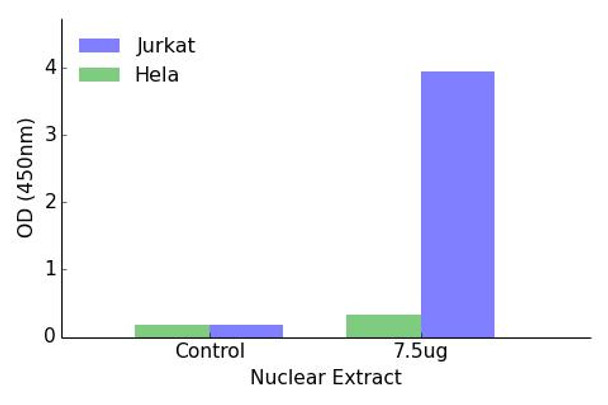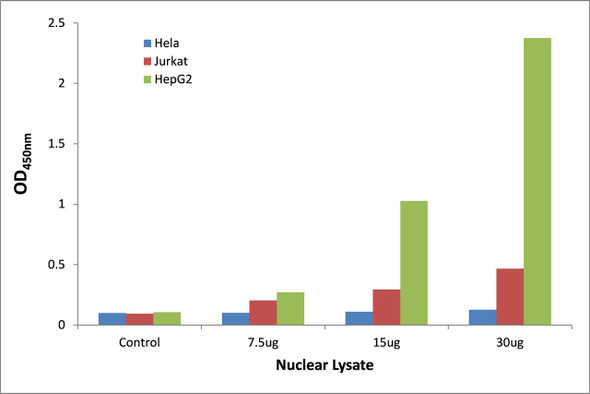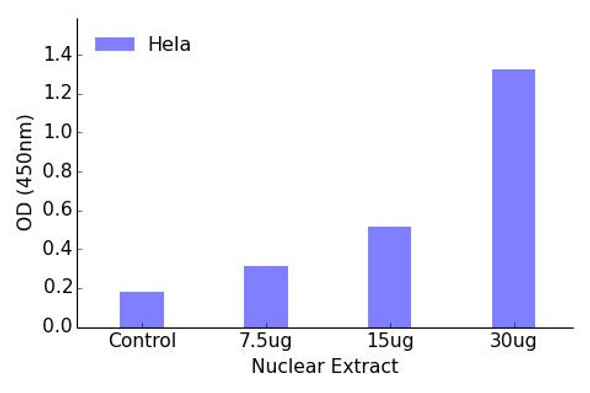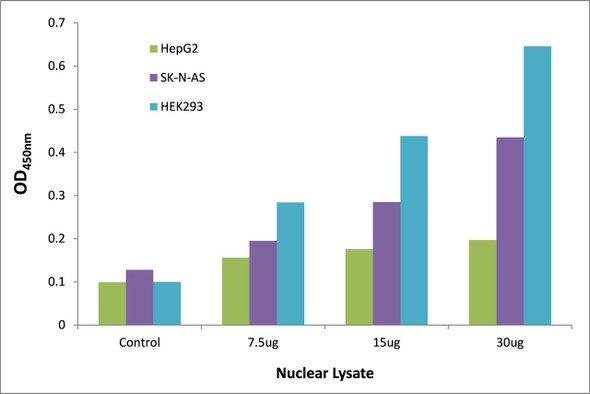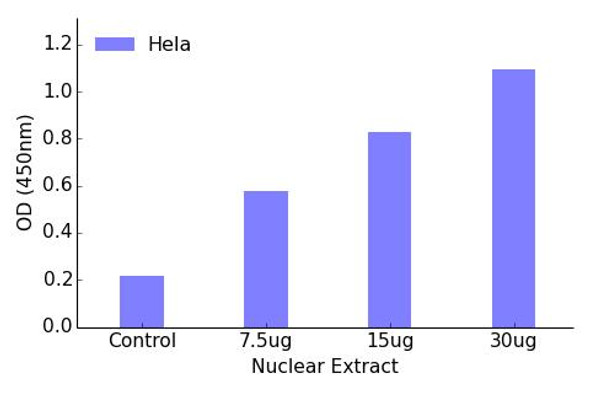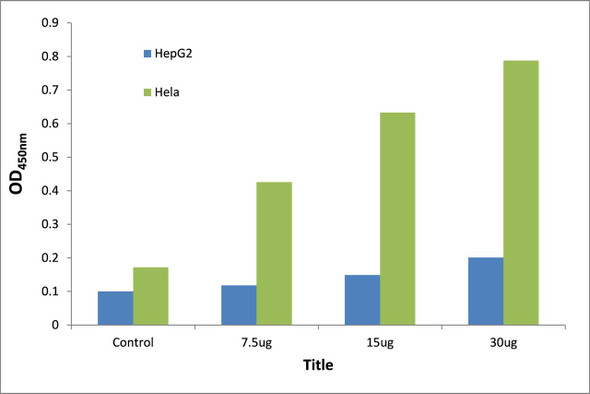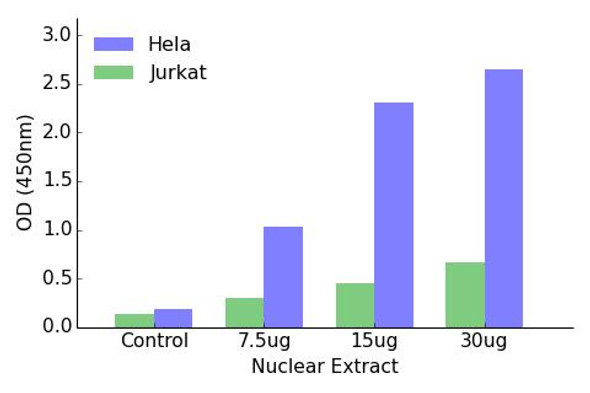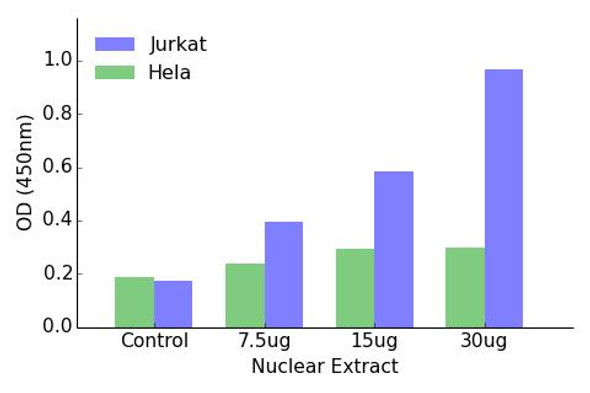TCF7 Transcription Factor Activity Assay
- SKU:
- TFAB00132
- Product Type:
- ELISA Kit
- ELISA Type:
- Transcription Factor Assay
- Analytes:
- TCF7
- Reactivity:
- Human
- Mouse
- Rat
Description
TCF7 Transcription Factor Activity Assay
The TCF7 Transcription Factor Activity Assay Kit is a powerful tool for studying the activity of TCF7, an important transcription factor involved in key cellular processes. This kit allows for the accurate and sensitive detection of TCF7 activity in various biological samples, including cell lysates and tissue homogenates.TCF7 is known to play a critical role in cellular development, differentiation, and signal transduction pathways. Dysregulation of TCF7 activity has been implicated in various diseases, including cancer, inflammatory disorders, and developmental abnormalities.
Therefore, monitoring TCF7 activity can provide valuable insights into disease mechanisms and potential therapeutic targets.With its high performance and versatility, the TCF7 Transcription Factor Activity Assay Kit is an essential tool for researchers studying transcriptional regulation and its impact on cellular physiology and disease pathogenesis. Trust in this kit for reliable and reproducible results to advance your research efforts.
| Product Name: | TCF7 Transcription Factor Activity Assay |
| Product Code: | TFAB00132 |
| Target: | TCF7 |
| Synonyms: | T-cell-specific transcription factor 1, T-cell factor 1, TCF-1 |
| Reactivity: | Human, Mouse, Rat |
| Sample Types: | Nuclear or cell lysates |
The Assay Genie TCF7 transcription factor activity assay allows for the detection and qualitative analysis of endogenous levels of activated transcription factors in a variety of nuclear and cell lysates
Assay Genie ELISA kits are designed to significantly reduce experiment time and ensure sensitivity and flexibility for high-throughput screening.
| Assay Time: | 4.5 hours |
| Detection Method: | Colorimetric 450 nm |
| Size: | 12 x 8-Well Microstrips |
| Storage: | 4°C for 6 months |
| UniProt Protein Function: | TCF7: Transcriptional activator involved in T-cell lymphocyte differentiation. Necessary for the survival of CD4(+) CD8(+) immature thymocytes. Isoforms lacking the N-terminal CTNNB1 binding domain cannot fulfill this role. Binds to the T- lymphocyte-specific enhancer element (5'-WWCAAAG-3') found in the promoter of the CD3E gene. May also act as feedback transcriptional repressor of CTNNB1 and TCF7L2 target genes. TLE1, TLE2, TLE3 and TLE4 repress transactivation mediated by TCF7 and CTNNB1. Binds the armadillo repeat of CTNNB1 and forms a stable complex. Interacts with AES, TLE1, TLE2, TLE3 and TLE4. By TCF7L2 and CTNNB1. Predominantly expressed in T-cells. Also detected in proliferating intestinal epithelial cells and in the basal epithelial cells of mammary gland epithelium. Belongs to the TCF/LEF family. 16 isoforms of the human protein are produced by alternative promoter. |
| UniProt Protein Details: | Protein type:DNA-binding; Transcription factor Chromosomal Location of Human Ortholog: 5q31.1 Cellular Component: nucleoplasm; transcription factor complex; nucleus Molecular Function:protein binding; sequence-specific DNA binding; beta-catenin binding; chromatin binding; transcription factor activity Biological Process: neural tube development; transcription, DNA-dependent; alpha-beta T cell differentiation; Wnt receptor signaling pathway through beta-catenin; regulation of cell proliferation; regulation of transcription from RNA polymerase II promoter; embryonic digestive tract morphogenesis; generation of neurons; T cell receptor V(D)J recombination; immune response; brain development; embryonic genitalia morphogenesis; embryonic hindgut morphogenesis |
| NCBI Summary: | The protein encoded by this gene is a transcriptional activator that plays an important role in lymphocyte differentiation. This gene is expressed predominantly in T-cells. The encoded protein can bind an enhancer element and activate the CD3E gene, and it also may repress the CTNNB1 and TCF7L2 genes through a feedback mechanism. Several transcript variants encoding different isoforms have been found for this gene. [provided by RefSeq, Oct 2011] |
| UniProt Code: | P36402 |
| NCBI GenInfo Identifier: | 209572716 |
| NCBI Gene ID: | 6932 |
| NCBI Accession: | P36402.3 |
| UniProt Secondary Accession: | P36402,Q86WR9, Q9UKI4, B3KSH3, |
| UniProt Related Accession: | P36402 |
| Molecular Weight: | 384 |
| NCBI Full Name: | Transcription factor 7 |
| NCBI Synonym Full Names: | transcription factor 7 (T-cell specific, HMG-box) |
| NCBI Official Symbol: | TCF7 |
| NCBI Official Synonym Symbols: | TCF-1 |
| NCBI Protein Information: | transcription factor 7; T-cell-specific transcription factor 1 |
| UniProt Protein Name: | Transcription factor 7 |
| UniProt Synonym Protein Names: | T-cell-specific transcription factor 1; T-cell factor 1; TCF-1 |
| Protein Family: | Transcription factor |
| UniProt Gene Name: | TCF7 |
| UniProt Entry Name: | TCF7_HUMAN |

